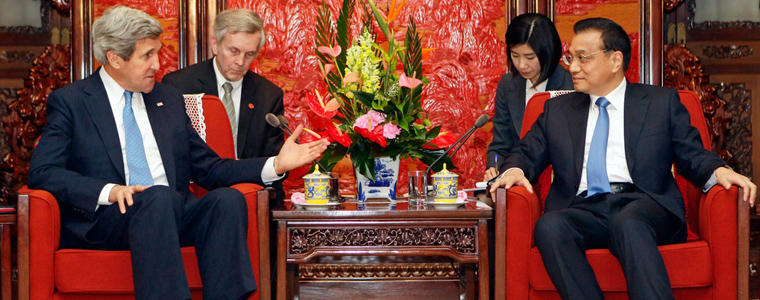
John Park, a senior Asia adviser at USIP, says China is exploring how to modify its North Korea policy because of concern that the recent explosive rhetoric and potential South Korean and/or U.S. responses to North Korean actions could lead to a dangerous region-wide escalation.
“China is now faced with a strategic dilemma – maintain the status quo of prioritizing stability of the North Korean regime or address the growing North Korean threats to regional stability,” said Park, who also is a Stanton Nuclear Security Junior Faculty Fellow at MIT and an associate with the Harvard Kennedy School's Belfer Center. “Following Secretary of State John Kerry's visit to Beijing, the new Chinese leadership is signaling that it will seek to do more” to reduce the prospect of regional escalation.
While the birthday of North Korea’s founder, Kim Il Sung, passed on April 15 without a missile test that the U.S. and neighbors are expecting amid the stream of vitriol coming from the country in recent months, the planned launch may still be pending. Park said reports indicate North Korea has fueled rockets in preparation and that technical experts say that generally means a launch is imminent because of the highly corrosive nature of the liquid fuel.
Kerry completed a three-day trip to the region this week to confer with treaty allies Japan and South Korea and try to persuade officials in Beijing to help rein in North Korea. The visit to China, in particular, was timely, Park said. It gave the Chinese leadership an opportunity to signal to North Korea, the U.S. and other neighbors that China is concerned about regional stability, not just the stability of the North Korean regime.
“In recent years, China has been dealing with North Korea through the lens of a false choice -- tolerating a nuclear North Korea or picking up the pieces of a failed state on its border,” Park said. “This false choice led to China increasingly propping up the North Korean regime.”
North Korea’s behavior under its new leader, Kim Jong Un, has put China in a difficult spot, Park said. The U.S. response of stepping up its defensive posture nearby creates a scenario that officials in Beijing would hope to avoid.
Adding to concerns is Seoul’s new defense doctrine of “proactive deterrence,” which authorizes the South Korean military to take out North Korea’s military high command in response to an attack. South Korean President Park Geun-hye recently held a press conference with senior military commanders and the defense minister and said any attack should be met with such a response “without any political consideration,” USIP’s Park said. That increases the risk of accidental escalation, he said.
The White House announced on April 15 that President Obama has invited his South Korean counterpart for a visit on May 7.
The Chinese leadership is unlikely to make wholesale changes to its policy on North Korea, USIP’s Park said. Possible indicators of even a modest shift include curtailing business activities of North Korean state companies in China such as canceling or not renewing visas for managers; paring Chinese interaction on mining such as imposing new border restrictions; or conducting bilateral relations with North Korea through their foreign ministries rather than the higher Communist Party of China-Workers’ Party of Korea channel, as is done now.
Park says the U.S. military is monitoring the situation more closely than in the past and has worked out a structure for a joint U.S.-South Korean response that potentially gives American leaders a degree of influence over the scope and scale of any retaliation.
Tell us your thoughts on what the threshold should be on North Korean action that would prompt a retaliation? Submit your comment below.
Viola Gienger is a senior writer at USIP.



